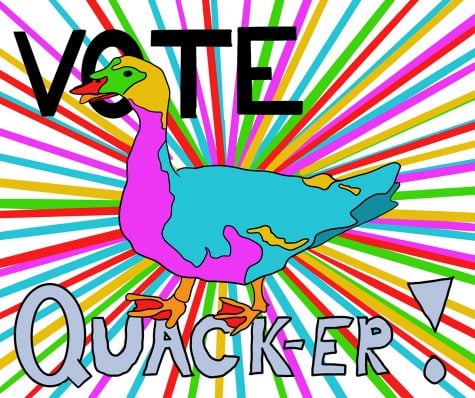Goof: Faculty exclusive poetry slam leads to rally
Disclaimer: This story is a part of out April Fool’s edition, The Goofordian. This story was created by Guilfordian Staff and is not based in fact.
Chaos erupted at the English and Creative Writing Department poetry slam Tuesday night in room 203 in Duke Hall.
The department held the poetry slam exclusively for faculty members. Several professors participated in a two-round elimination style competition where the theme was to express their disdain with students. However, emotions arose at the event due to some of the final remarks in the second round from Associate Professor of English Diya Abdo, who said she intentionally gives students a larger workload during midterm and final exam weeks.
A line in her second-round poem read, “Ignore your syllabus, go ahead, I’d have no clue/That’s why you won’t notice the trap set up for you.”
Before the night of the event, senior English major A. A. Ron III had gotten word that the poetry slam was happening and decided to organize a small group of students to crash the event.
Ron III had placed an iPhone left on FaceTime underneath the podium in the classroom. He and his group had been quietly waiting in a classroom nearby. Upon hearing the line, the outraged students barged into room 203 and demanded answers.
The students interpreted Diya’s poetry as a threat. Ron III described this period as haunting due to the “overbearing” amount of work.
“There are nights when I have to pull all-nighters, and it’s not like I’m putting the work off,” said Ron III. “It feels like as soon as get a start on one assignment, another is dropped on my plate. Then I’m told it’s my fault they all aren’t completed to my best ability. To hear that a professor would intentionally put that stress on me is disappointing.”
Abdo advanced to the second round along side Visiting Associate Professor of English and Creative Writing Jennie Malboeuf and Professor of English Jim Hood ‘79.
Hood, in his first-round poem entitled “Deep Regrets,” gave the audience the line, “To teach English class, I thought it’d be fun/It’s a pain in the, ugh, shouldn’t say that one.”
Malboeuf earned a spot in the second round mainly due to her strong metaphor of what she pictures of a student study session and a forest fire.
“The tree’s already gone, so you’ll just sit there and stare/If I go in your room, I’m sure I’ll see trees burning in there,” she said.
Moving to the second round, Hood, in “The Next Time, I Swear to God…,” made clear to the audience that the moment of silence does not mean make noise while reaching in a book bag.
To top her competitors, Abdo, in her poem “Snake in the Class,” used the line that appeared to reference a calculated plan to put heavy amounts of work on students nearing exam time.
As the students received no answers from any of the professors in the room, they began to bang on and throw desks.
“We felt we had been manipulated and mistreated,” said sophomore biology major and English minor Karen Young. She was one of the students who crashed the poetry slam. “I am not even doing this for a major and yet it feels like the workload around exam time gets that way. We couldn’t just sit there, hear that it’s all on purpose, and do nothing.”
The professors in attendance expressed that they were horrified at first, but then realized that the students could not do anything to them except yell.
“Yeah, it was a little nerve wracking at first when they started to get loud,” said Associate Professor of English Mylène Dressler. “But the smell of ramen on their breath made it hard to take them seriously.”
The faculty members decided to just leave the room and the building, ending the event without any threat to them from any students.
“They just got up and left,” said Young. “We were all so confused, like, they just completely ignored us. So, instinctively I guess, we just kept yelling at them as they left. But I still think we got to them a little bit.”
All in all, it was Malboeuf who won the competition. Malboeuf continued to incorporate her first poem’s image in her second-round piece, questioning why students bought the whole textbook if page 420 is all they care about.
To an extent, this was a victory for the students, as the English and Creative Writing Department announced they have decided to discontinue any plans of future faculty poetry slams.






